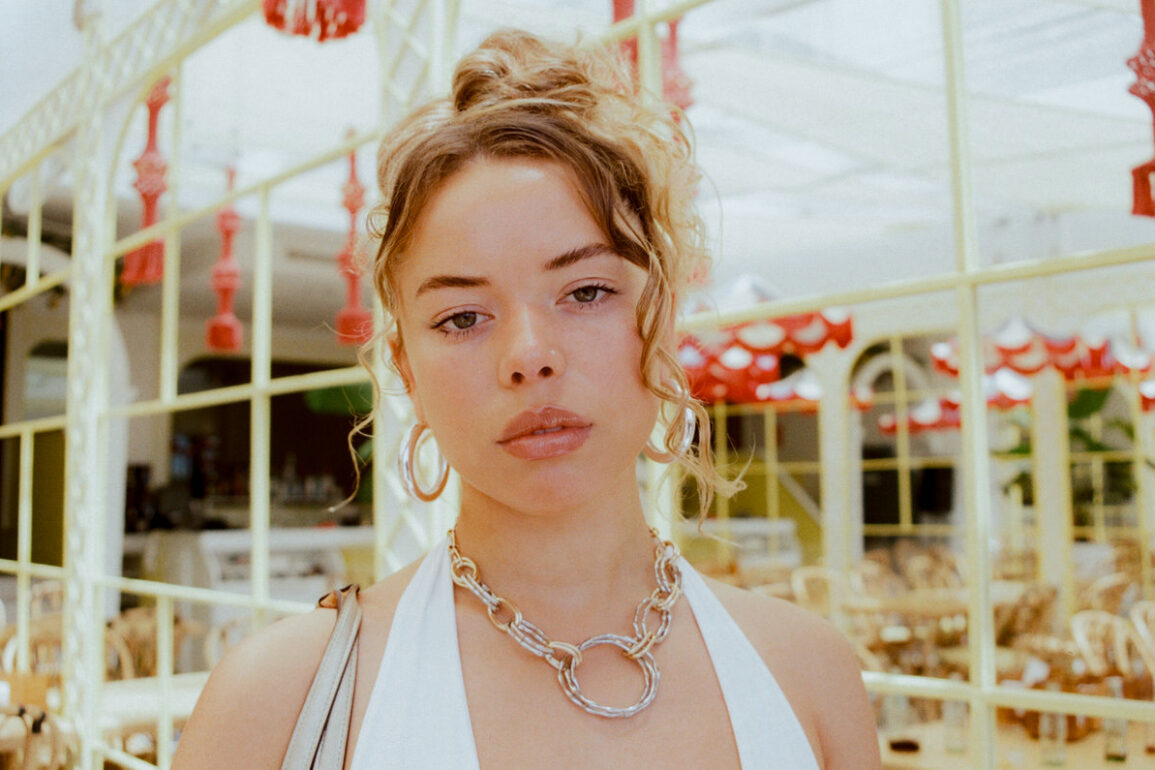Nilüfer Yanya is back with her blasting third studio album, My Method Actor. We chatted with Yanya on Zoom to find out more.
It’s been two years since our last interview. Nice to see you again.
Nilüfer Yanya: Nice to see you.
Your new album My Method Actor will be out by the time we publish this article, and it just coincides with the start of the autumn. How is the weather there, is it autumn vibes already?
This week was actually really nice weather, so it felt summery, but I’m sure it will go back to autumn weather. It’s a bit cloudy today, but it’s not cold.
Do you think you’re more of a summer person, or an autumn person?
I think I’m a summer person, but autumn has always been a good time of the year for me. I love September generally. It’s, a nice time depending on where you are, because it can still be summer sometimes. It’s like a nice, non-pressured time, normally.
You are looking at yourself through the mirror on the album cover, and I know that the album has themes of self introspection through questions like “who are we?” and “why do we follow the road that we’re on?” Maybe we could start talking about the album through that theme and what kind of self discovery that process has brought upon you in a general aspect.
This album is my third album, so I kind of felt like I’m getting a bit deeper into the question of why am I making music in the first place. What’s the reason in making another record? Why keep making records? I proved to myself that I can do it. So what’s the real reason that I’m still doing it? Because I feel like the first and second albums are kind of like, “Can you do it? Can you make an album? What’s going to happen?” Now it’s like, “Okay, I can do this, but why? Why keep going?”
Have you found the answer, and is the answer “Because my music is good”?
(laughs) I feel like the answer is hidden in the process. So I don’t have it. But I think if I stopped making music today after this album, I would never know what it was about. Do you know what I mean? It would just be a weird phase. I know that lots of people do things in their twenties and then in their thirties, maybe they’re like, “Actually, I want to have a family!” or, “I want to move here. I want to change my life. I want to do something different.” But I don’t think I’ll stop doing music, and I think if I did stop doing music, I would never know why I did it in the first place. I feel like I just kind of started this journey, and I just want to keep going and find out what it’s about. (laughs)
What we want to do generally in life may change in the course of time, and any scenario is possible, really. I know that Leonard Cohen started making music after the age of 30, which is very rare, but still.
Yeah, I don’t think I’ll stop. I just think I’m interested in adding different things to my life right now. I want to do music, but also, that shouldn’t stop me from doing other things. I had to take up so much focus and time to get to this point. I’d like to do other things though, not just this forever.
As an artist, you’re an experimentator. In this album too, there are so many contrasting sounds, including harsh guitar tones over more indie pop melodies. Do you think that stance comes from a sense of questioning and looking to reach out to more as an art?
Yeah, I think it’s all about not stopping yourself from trying things. It’s admitting that you don’t know your own music, really. You don’t know your own style. It’s something to explore. Some of the songs on this record are not necessarily indie rock, but that doesn’t mean you can’t go and make them. I think I’ll still be the same artist. You shouldn’t let that stop you experimenting with other styles. You could be a completely different artist in five years time.
I agree, and I think it helps that fandoms of this day and age are more accepting towards other genres.
Yeah. Like, I don’t think anyone really cares about genre anymore, do they?
It’s all post-genre.
Yeah.
For this album, you mostly worked in a confined environment in the studio with only one other person, Wilma Archer. Of course, in different situations, having more people may be better for the creative process, but for this album, does having just one more creative person in the room help as a sort of meditative experience to understand you and your art?
Yeah, it really helps. Working with one other person is the closest you can get to working alone again, I think. (laughs) It’s a very reflective period of time because you’re always bouncing off each other and you only have to listen to each other’s opinions, and care about what the other person’s saying. It gets confusing, but it doesn’t get as confusing as the other scenario. You’re not trying to impress anybody else or. I think it makes an honest working environment, but also can be a bit intense, because it’s like everything feels like a big decision. (laughs)
There is anonymous quote that goes, “Art is never finished, merely abandoned.” You can build up on a certain piece forever, but you have to stop it at some point. For this album, would you say abandoning the tracks the right spot became easier to you in a way?
I think so, yeah. Maybe because it’s my third album as well. You feel a bit more relaxed, because you know that there was something before this, and there will probably be something after this. It doesn’t have to be the final masterpiece. It doesn’t have to be the last thing you will ever do. Even though I sometimes feel like, “Oh, I’m never gonna write anything ever again.” I also do know that I probably will, because that’s how everything’s been going. (laughs) It’d be out of the ordinary if I never made another piece of music after this. So I feel a bit more relaxed about that. “Okay. You can let it go.”
I want to squeeze in a question that I occasionally ask artists nowadays because it’s a topic that interests me, and that is the subconscious. How often do you see dreams? Do you have an active dream life? Do you think the dreams you see affect you in some way?
Definitely. I feel like your dreams are generally your subconscious already. It’s what’s going on underneath. So by the time you’ve dreamed it, you’ve already been thinking about these things anyways on some level. And also, they say that in your dreams, you’re working out your problems, finding solutions to things, and I feel like it’s the same in music. When I’m writing, I’m always trying to find a kind of solution, some kind of conclusion almost. I’m trying to work something out so it feels like they’re similar in that way. It is kind of a dream, because it’s not really something you can grasp all the time. It’s a bit untangible.
If you were to pick two songs from the album, one easiest and one hardest to create, which two do you think would you pick?
I feel like “Method Actor” was actually one of the easiest, and it kind of came at the start of the process. Maybe that’s why it was easier, because there was less expectation. Then the hardest one was, I don’t know, maybe “Like I Say (I runaway)”. The verse was really easy, and then getting the chorus right was actually so tricky, and it kind of took on a different shape.
How much material, more or less, were left out from the final product?
Well, quite a few songs were abandoned in earlier stages, and I think that’s a difficult decision to make, because we didn’t really have unlimited time to make the record. So we couldn’t get to the end of the album and then abandon things. If something wasn’t working, you had to decide, in the moment, “I’m going to abandon this!” We’ve already spent 12 hours working on the song. I don’t want to spend any more time working on it because I don’t think it’s going to be on the final record. But what’s good is that we didn’t abandon anything at the end. It was like we had to believe in something all the way through, or let go of it halfway. It wasn’t like eliminating at the end, which was nice. We actually had to write another song at the end. (laughs) so it was, like, adding to it instead.
The next question was suggested to me by a friend of mine: Is there a Turkish word or phrase that you love the most?
I don’t know. Maybe minik kuş. My dad always used to sing us that nursery rhyme, Mini Mini Bir Kuş Donmuştu. It’s a nice phrase. I also like the word mavi. What about you?
I’m not sure, but I am a fan of some longer Ottoman-era words, like müşkülpesent and merdümgiriz. The first one means “picky”, while the letter is like an earlier version of the term “anti-social.”
That’s cool.
I don’t know why, they just sound poetic. I’m not sure I have a solid reasoning for liking them.
I think Ottoman was quite poetic, though, right?
It was. I want to ask you two more questions. Among the artists you would like to collaborate with some day, off the top of your head, who or what project come to mind?
Maybe Steve Lacy?
He’s cool.
He’s making some nice stuff with other artists right now, and he has a nice production style.
I think your vibes and styles could be a good match as well. I highly endorse you reaching out to him.
I’m too shy. (laughs)
Hopefully, it will happen some day. Last question: Can you name the last three thing you listened to on your streaming platform?
There is “Apple” by Charli XCX. Then there is Sharon Van Etten, do you know her?
Yeah. She’s really cool.
I listened to “Our Love.” The other one’s a podcast, maybe that doesn’t count. (laughs) Then there is Tori Amos with “Crucify.”
That’s pretty good, actually. Not too embarrassed.
You can check out Nilüfer Yanya’s Bandcamp profile here.



